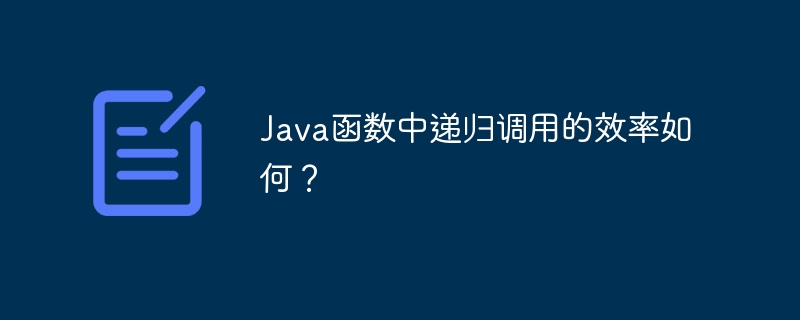Home >Java >javaTutorial >How efficient are recursive calls in Java functions?
How efficient are recursive calls in Java functions?
- WBOYWBOYWBOYWBOYWBOYWBOYWBOYWBOYWBOYWBOYWBOYWBOYWBOriginal
- 2024-05-03 14:06:021264browse
Efficiency can be improved by using recursion carefully, including: reducing the number of recursive calls, using loops instead, using tail recursion optimization, and using stack overflow protection mechanisms. Using a loop instead of recursion can significantly improve the efficiency of calculating factorials because stack frames do not need to be created and destroyed.

Efficiency of recursive calls in Java functions
Recursion is a powerful programming technique that allows functions to call themselves. When a recursive call is executed, Java creates a new stack frame that contains a copy of the function's parameters and local variables. The creation and destruction of stack frames requires additional overhead, so frequent recursive calls may lead to program inefficiencies.
Factors affecting efficiency:
- #Number of recursive calls: The more recursive calls, the greater the creation and destruction of stack frames. The more, the lower the efficiency.
- Stack space: The Java stack has limited space, and frequent recursive calls may cause stack overflow exceptions.
- Recursion depth: The greater the recursive call depth, the more copies of the function's parameters and local variables, and the more memory required.
Avoid inefficiency:
In order to avoid the inefficiency of recursive calls, you can consider the following solutions:
- Use loops: If possible, use loops instead of recursion to perform tasks.
- Use tail recursion optimization: Using compiler optimization (such as tail recursion optimization), tail recursive calls can be converted into loops.
- Use stack overflow protection mechanism: Java provides the StackOverflowError exception, which is thrown when there is insufficient stack space. The stack size can be increased by setting the -Xss option.
Practical case:
Consider such a Java function that uses recursive calculation of factorial:
public static int factorial(int n) {
if (n == 0) {
return 1;
} else {
return factorial(n - 1) * n;
}
}For larger values of n, this Functions may cause stack overflow exceptions. We can rewrite this function using a loop to be more efficient:
public static int factorialIterative(int n) {
int result = 1;
for (int i = n; i > 0; i--) {
result *= i;
}
return result;
}This loop version is much more efficient because it does not require the creation and destruction of stack frames.
Conclusion:
Recursive calls are a powerful tool, but they must be used with caution. Frequent recursive calls may lead to reduced efficiency and stack overflow. By understanding the factors that affect efficiency and adopting schemes to avoid inefficiencies, you can use recursion efficiently where appropriate.
The above is the detailed content of How efficient are recursive calls in Java functions?. For more information, please follow other related articles on the PHP Chinese website!

